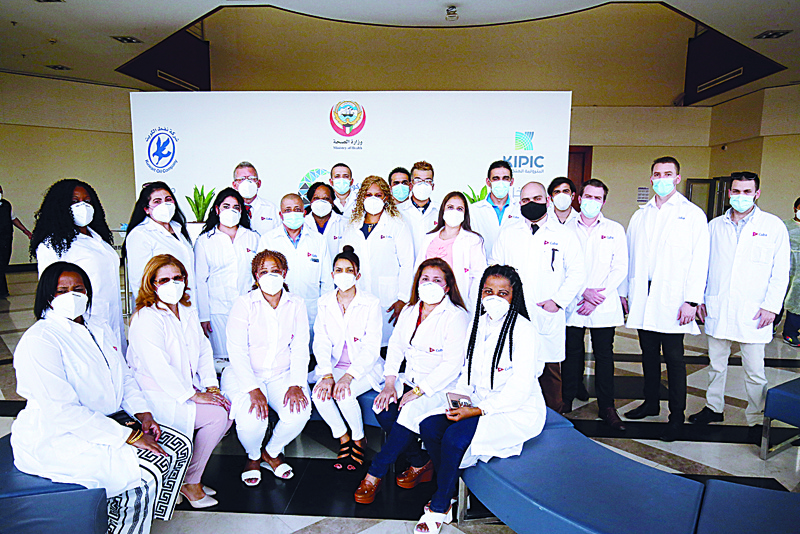 KUWAIT: Members of the Cuban medical team in a group photo yesterday. - Photo by Yasser Al-Zayyat
KUWAIT: Members of the Cuban medical team in a group photo yesterday. - Photo by Yasser Al-Zayyat
By Ben Garcia
KUWAIT: A contingent of Cuban medics - doctors and nurses - are leaving after completing a year of service in Kuwait. The last group of 60 medical workers who filled roles at the Mishref coronavirus field hospital are wrapping up their work and heading home. Several members of the larger mission, which comprised of more than 300 Cuban medical workers who served six-month terms in the last year and half, were infected with the coronavirus while working in Kuwait.
A small ceremony to mark the departure of the medical workers was held at the Mishref field hospital, attended by Dr Muhamad Al-Humaidan and Jose Luis Noriega Sanchez, Ambassador of Cuba to Kuwait. The Cuban medical workers were initially hired by Kuwait's ministry of health to support the country's pandemic efforts from June 5, 2020 for a six-month term. But the team's stay was later extended for another six months due to the high number of COVID-19 cases in Kuwait.
"We've handled more than 100,000 patients at our assigned hospitals, mostly COVID-19 patients," said Rody Cervantes Silva, family medicine specialist and head of the Cuban medical team to Kuwait. "The number of cases are now down and cases in ICUs are also dropping," he said.
On June 5, 2020, the team arrived with 298 doctors and nurses, and requested an additional 37 doctors in August 2020. "We were a total of 337 medics (198 nurses and 137 doctors); some left after six months, some left after 10 months, while the remaining 60 doctors and nurses are here for the past one year. We are all going back on June 7 (today) and will return to our families after the successful completion of our medical mission," Silva added.
COVID-19 hospitals
Cuban doctors and nurses were deployed specifically to COVID-19 hospitals designated by the Kuwaiti government, including Jaber Hospital, Amiri Hospital, Adan Hospital, Farwaniya Hospital, Ibn Sina Hospital, Mubarak Hospital, Jarrah Hospital and the Mishref Field Hospital. "It's definitely a mission worth remembering - even our team was infected, as 12 of us contracted the virus. We were able to help both locals and expats of all nationalities.
At the beginning we were also assisting in some other medical cases, but the coronavirus was our main concern. Some of us would even be at the hospital for 24 hours, especially during the onset of the pandemic. We all want our patients to recover and not die. We are racing against time and want everyone to be healed and go back to their families. Many of our patients returned with letters of encouragement and thanks," Silva told Kuwait Times.
The Cuban ambassador thanked Kuwait for trusting Cuban doctors and nurses for the dangerous mission, saying they did so in solidarity with Kuwait. Sanchez pointed out that Cuba has sent more than 13,000 doctors and other medical professionals around the world since the outbreak of the pandemic. "Last year, we helped fight the coronavirus in Italy. The medics received medals from the president of Italy himself for helping them.
But this is not about medals or propaganda - it's about humanity. We helped people regardless of nationality and showed them our human side," the envoy said. "We sent 13,000 Cuban doctors and nurses all over the world to specifically deal with the coronavirus. This is apart from the 28,000 doctors from Cuba present in 57 countries around the world. In Kuwait we have around 38 doctors working in various hospitals and private clinics," he added.
Rumors refuted
Sanchez refuted reports in some newspapers last year that Cuban doctors receive a monthly salary of KD 2,500. "Not at all - it's a big lie, it's fake news. They get a salary (from the ministry of health in Kuwait), but not the full salary because they are on a solidarity mission. The most important issue here is how many lives they have saved; how many people they have given another chance to live. The human side of our mission is most important. They left their families in Cuba and came here despite the danger to their own lives. They didn't even consider the language barrier they might face here; they just came to help and they did that - mission accomplished," he said.
Kuwait Times asked Sanchez how Cuba is able to send doctors and nurses abroad. "Because our government gives priority to people who want to study medicine. They are educated free of charge. Being a doctor is the most difficult career in Cuba. But they work hard on it and are very successful. It completely depends on our students' capabilities, as young people in Cuba can choose their career path," he said. "That is why we can help and can send many doctors and nurses all over the world to help. For example, in Africa, we have many medics that are paid by our government. Not a single dollar is paid by those countries," Sanchez added.
.jpg)


